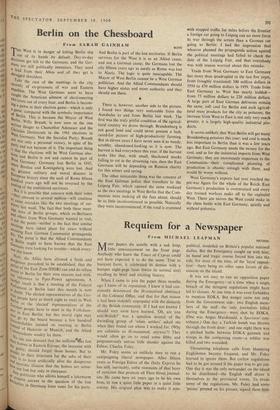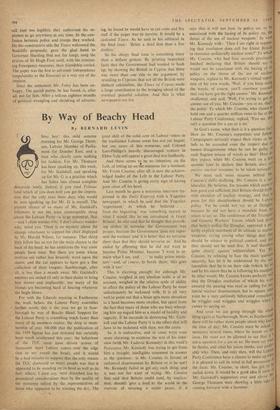Requiem for a Newspaper
From MICHAEL LEAPMAN OST papers die quietly with a sad, limp, little announcement on the front page. Anybody who knew the Times of Cyprus could not have expected it to do the same. True to , buoyant form, it celebrated its demise with a bumper eight-page issue (twice its normal size) recalling its brief and exciting history.
When I came to join the paper three months ago I knew of its reputation. I knew it had con- sistently denounced the ill-conceived obstinacy of the Colonial Office, and that for that reason it had been violently unpopular with the diehards of the British community. If I had not known I should very soon have learned. 'Oh, are you anti-British?' was a question several of the dwindling group of 'white settlers' asked me when they found out whom I worked for. (Why are colonists so ill-mannered, anyway?) They would often go on to retail some filthy and preposterously untrue little slander against the Editor, Charles Foley.
Mr. Foley seems an unlikely man to run a campaigning liberal newspaper. After fifteen years as Foreign Editor of the Daily Express he has still, inevitably, some remnants of that layer of cynicism that protects all Fleet Street journal- ists. He came here six years ago to be his own boss, to run a quiet little paper in a quiet little colony. His original plan was to make it non- political, modelled on Britain's popular national dailies. But the Emergency caught up with him; its banal and tragic course forced him into the role, for most of the time, of the 'loyal opposi- tion'—there being no other open forum of dis- cussion on the island.
It was not easy to run an opposition paper during the Emergency—ara time when a single breach of the stringent regulations might have led to closure. At one time it was even forbidden to mention EOKA. But danger came not only from the Government side: two English mem- bers of the staff—the only journalists killed during the Emergency—were shot by EOKA. (One was Angus Macdonald, a Spectator' con- tributor.) One day a Turkish bomb was thrown through the front door: and one night there was a pitched battle between EOKA gunmen and troops in the composing room—a soldier was killed and two wounded.
Threatening telephone calls from blustering Englishmen became frequent, and Mr. Foley learned to ignore them. But curfew regulations had to be got around if the paper was to get out. One day it was the only newspaper on the island to be distributed—the English staff drove it themselves to the provincial towns. To evade some of the regulations, Mr. Foley had some 'passes' printed on his presses, signed them him- self (not too legibly); they authorised his re- porters to go anywhere at any time. In the -con- fusion between police and troops they worked. On the constructive side the Times welcomed the Radcliffe proposals; gave the glad hand to Governor Harding (but not for long); sang the praises of Sir Hugh Foot until, with the continu- ing Emergency measures, their friendship cooled. The paper was the first to advocate independence (unpalatable to the Enosists) as a way out of the impasse.
Since the settlement Mr. Foley has been un- happy. The parish pump, he has found, is, after all, not for him. After a tedious eighteen months of political wrangling and shrinking of advertis- ing, he found he would have to cut costs and fire staff if the paper was to survive. It would be a castrated Times. As he said in his editorial in the final issue: 'Better a dead lion than a live donkey.'
So the chirpy final issue is something more than a defiant gesture. By printing important facts that the Government had wanted to hush up; by showing the British in Cyprus that there was more than one side to the argument; by revealing to Cypriots that not all the British were diehard colonialists, the Times of Cyprus made a large contribution to the bringing about of the eventual peaceful solution. And that is what newspapers are for.



































 Previous page
Previous page